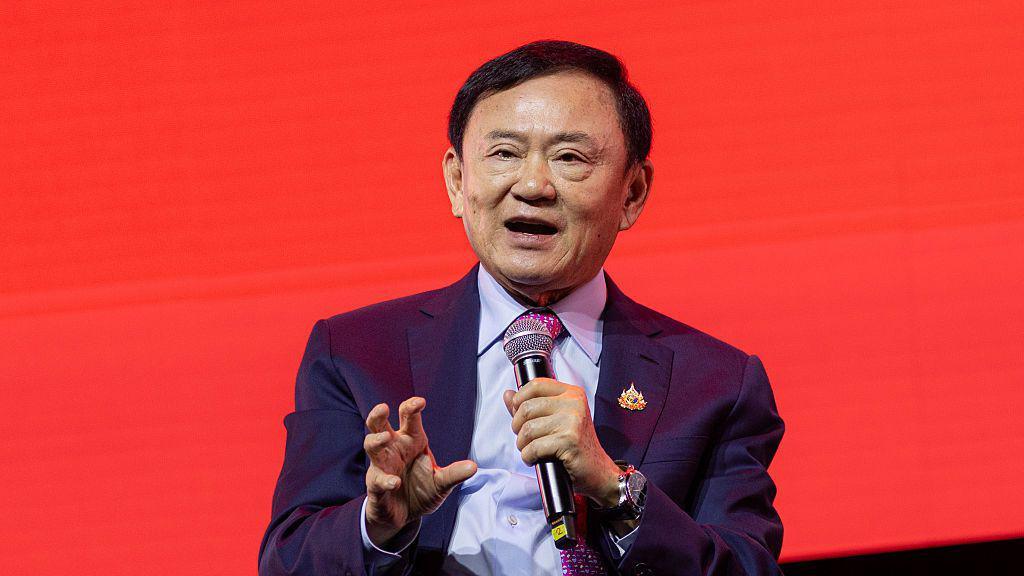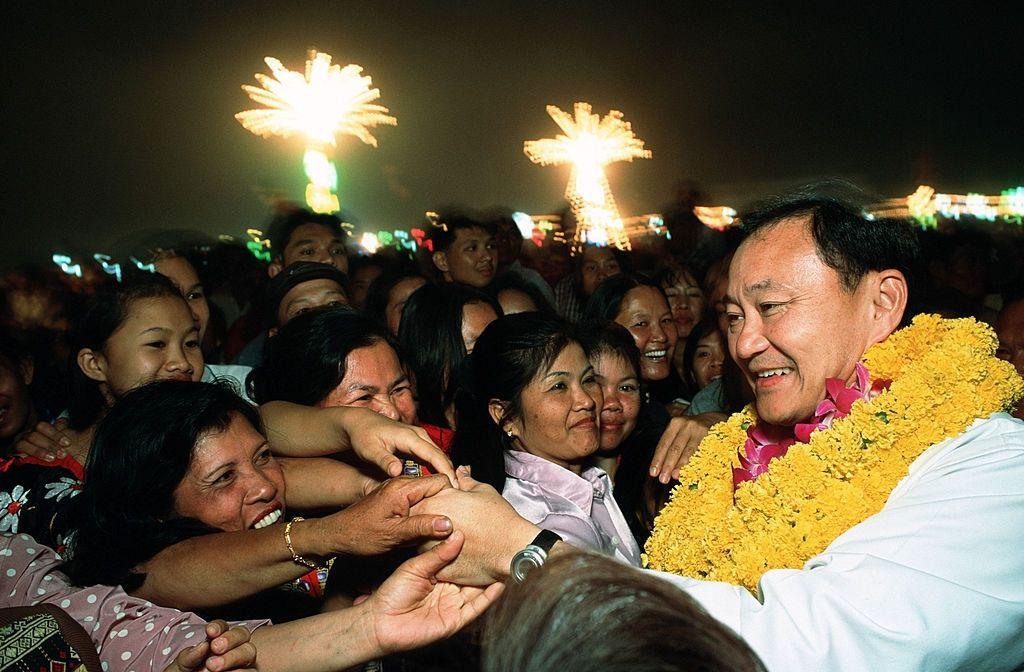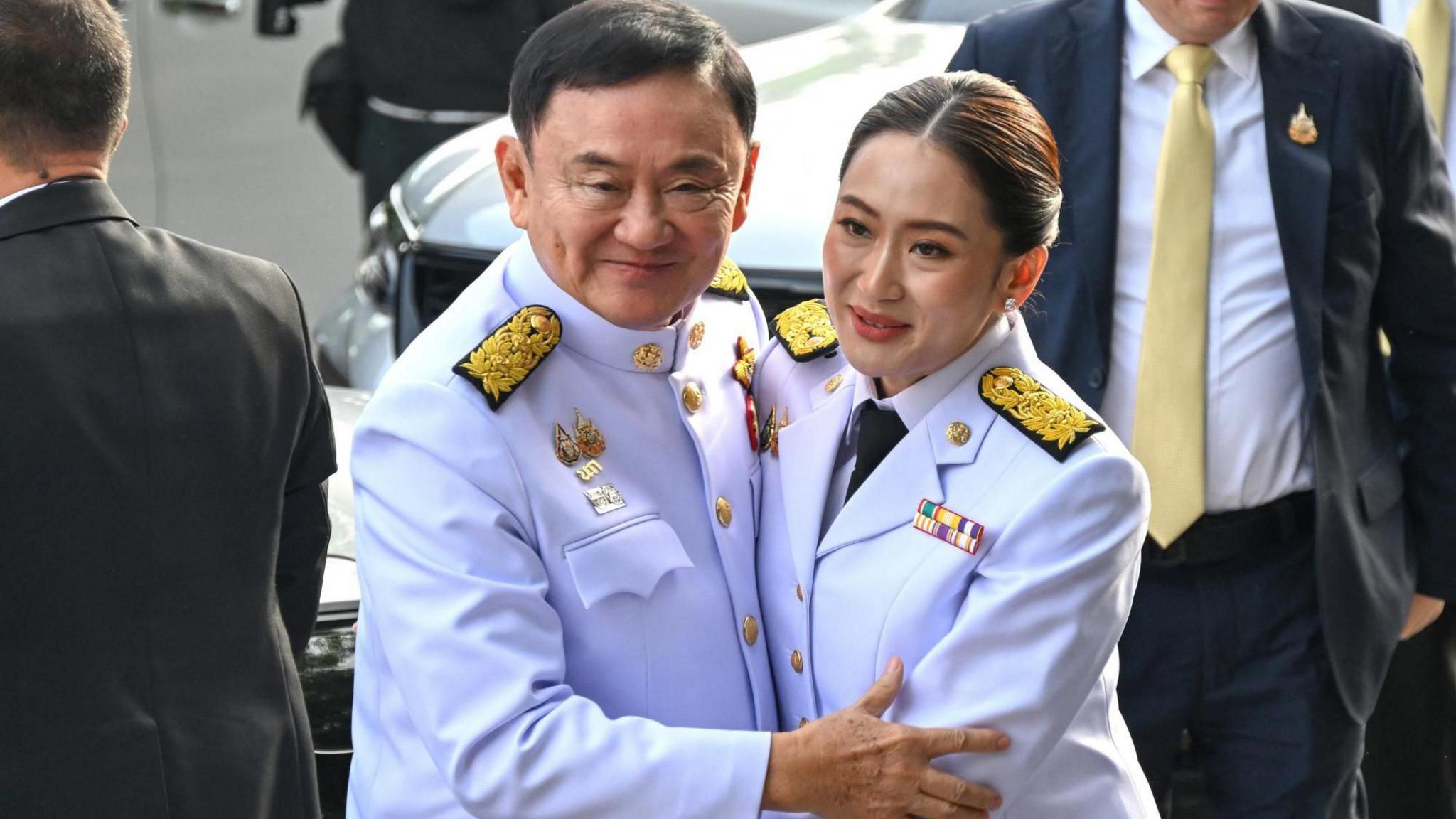Thailand: Who is Thaksin Shinawatra?

Thaksin Shinawatra, a policeman turned tycoon, is one of Thailand's most recognisable figures
- Published
For the last three decades, one man and his political dynasty have loomed large over Thailand's politics: Thaksin Shinawatra.
The cop turned tycoon turned prime minister has been one of the most influential but also polarising characters in the South East Asian nation, even long after he left office.
Now he faces a political reckoning, with the Supreme Court sentencing him to one year in jail.
It marks the latest development in Thaksin's turbulent rise and fall, in a country with an unpredictable political landscape.
From policeman to politician
Born in 1949 in the northern city of Chiang Mai, Thaksin started his career as a police officer.
In 1973 he received a government scholarship to study for a masters degree in criminal justice in the United States, and after returning to Thailand went into business, building a successful telecommunications empire during the late 1980s.
Then, in 1998, he founded the Thai Rak Thai (Thais Love Thais) party - and its rapid emergence transformed the country's politics.
Thaksin swept into office in 2001, soundly defeating the old guard from the Democrat Party.
Poorer voters liked his offers of cheap medical care and debt relief, as well as his nationalist platform and his contempt for the "Bangkok elite".
But big business also liked him for his CEO-style of government and his "Thaksinomics" policies, which created a new boom in a country hit by the Asian financial crisis of the late 1990s.
Thaksin also won support for his handling of the tsunami relief effort after the 2004 Indian Ocean disaster, which devastated parts of south-western Thailand.
Other things were not so easy. He had to face the fallout from his government's decision to suppress news of a bird flu outbreak, as well as criticism over the violent deaths of more than 2,500 people during a crackdown on drugs in 2003.
Thailand's Corruption Commission also found Thaksin had failed to declare all of his wealth - though he was later acquitted for this - and he was criticised over the government's handling of the upsurge in violence in the largely Muslim south.
Yet each time he faced pressure, Thaksin appeared to ride out the storm, thanks to the backing of his key support base of rural voters who called themselves "red shirts" after his party's colour.
He was the first prime minister in Thailand's history to lead an elected government through a full term in office, and won a second term in 2005.
But he also proved to be a divisive figure as he was deeply unpopular among conservative forces, which included Bangkok's elite, the military, as well as supporters of the monarchy known as "yellow shirts" - the colour associated with the monarchy in Thailand.

Thaksin received massive support from Thailand's rural poor in his early years as a politician
Political turmoil and exile
It was his family's decision to sell its shares in one of Thailand's biggest telecom groups, Shin Corp, that led to Thaksin's downfall.
The sale, in early 2006, which netted his family and friends $1.9bn, angered many urban Thais, who complained that Thaksin's family had avoided paying tax and passed control of an important national asset to Singaporean investors.
Amid large-scale street demonstrations, Thaksin called a snap general election for April 2006, effectively telling opponents to "put up or shut up".
But main opposition parties boycotted the polls and many voters chose to register a "no vote".
Faced with the threat of further protests, Thaksin said he would step down. He did for a few weeks, but returned to office in May.
In September that year, following months of political uncertainty, the military seized power while the prime minister was out of the country.
Thaksin relocated to the UK, but returned to Thailand shortly after his allies won the first post-coup elections in late 2007.
There he and his family faced a raft of corruption charges - allegations which the former Thai leader probably expected to come to nothing.
But the courts - greatly empowered by a new military-backed constitution - pursued the cases against him and his family with new vigour.
First his wife, Potjaman, and then Thaksin himself were sentenced to jail terms - with the Supreme Court finding the former leader guilty of corruption.
Thaksin left Thailand again and for many years lived in self-imposed exile, mostly in Dubai.
But he continued to exert influence in Thailand through his parties and his family, particularly his sister Yingluck and his daughter Paetongtarn, both of whom went on to become prime ministers.
The changing fortunes of the Shinawatra dynasty
Political parties backed by Thaksin and led by his proxies have consistently won elections, but have been unable to hold on to power for long.
The Thai Rak Thai party was dissolved in 2007, and its subsequent incarnation People's Power Party was dissolved in 2008 - the same year two of its prime ministers were disqualified.
The third incarnation of the Shinawatras' party, Pheu Thai (For Thais), has continued to survive, and in the 2011 election Yingluck Shinawatra led it to a landslide victory, becoming the first female Thai PM.
But she was disqualified by the courts, and her government ousted by another military coup.
At the 2019 election, Pheu Thai won far more seats than any other party, but was prevented from forming a government.
Then, in the 2023 election, Thaksin and Pheu Thai's fortunes appeared to change.
That year, the progressive Move Forward party stunned observers by winning the most seats in the lower house. Thailand's conservatives, long foes of Thaksin, needed him and his Pheu Thai party to form a coalition government to exclude Move Forward.
Thaksin's daughter Paetongtarn became prime minister the following year, bringing the Shinawatras back in power, when the coalition's leader was removed from office by the constitutional court.

Thaksin's daughter Paetongtarn (right) became prime minister in 2024
Thaksin also returned to Thailand in 2023 as part of this grand political bargain - and was greeted by hundreds of cheering supporters when his private plane touched down in Bangkok.
He was taken to the Supreme Court and sentenced to eight years in prison based on convictions over his previous corruption charges, which he has always maintained were politically motivated.
But after spending less than a day in a jail cell, he was moved to the luxury wing of the Police General Hospital after complaining of heart problems. Following his plea for a royal pardon, the Thai king commuted his sentence to one year.
Thaksin stayed in hospital for six months, then received parole and moved to his home in Bangkok.
But in September 2025, the Supreme Court ruled that this hospital stay was unlawful as Thaksin "knew or could perceive that he was not in a critical or emergency condition".
He was immediately sent to jail to serve out his one-year sentence.
It was not the only court case Thaksin faced - he was also separately accused of insulting the Thai king, but in August 2025 a court acquitted him of lese-majeste.
That same month, his daughter Paetongtarn was removed from office by the constitutional court over a controversial leaked phone call she had with Cambodian leader Hun Sen.
Thailand's parliament chose a new PM from a party that broke away from the coalition led by Pheu Thai.
Yet despite the setbacks, Thaksin and his family have vowed to fight on.
Shortly after Thaksin's prison sentence was announced, the 76-year-old released a statement on social media stating that "even though I lose my physical freedom, I will still have freedom of thought for the benefit of my country and its people".
"I will maintain my physical and mental strength to spend the rest of my life serving the monarchy, Thailand and the Thai people."